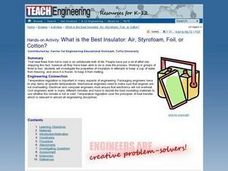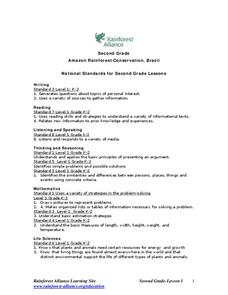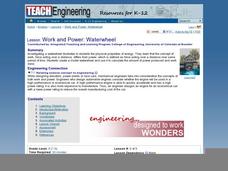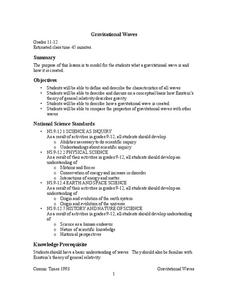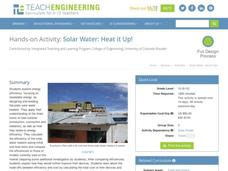Curated OER
An Introduction to Thermal Spray Technology
Students discuss difference between kinetic and thermal energy, develop and demonstrate understanding of key concepts and characteristics underlying thermal spray techniques, list items used in their daily lives that are coated, examine...
Curated OER
Climate Change
Students examine current school energy use and focus on energy saving measures that could be implemented. In this energy instructional activity, students are also encouraged to raise awareness of energy saving practices and behaviors...
Curated OER
Save the Earth: It's Everyone's Home!
Students create artwork to remind them to conserve the Earth. In this conservation lesson plan, students discuss the Earth's conservation and then create an art project representing what they can do to conserve.
Curated OER
Reducing Your Carbon Footprint to Help the Environment
Students examine their environment. In this carbon footprint lesson, students look at how he/she impacts their environment with the waste they create and the energy they use. As a class they read an article and listen to podcasts on how...
Curated OER
Recycling and Resources
Sixth graders examine ways to conserve natural resources. In this environmental lesson, 6th graders read the book Just a Dream and discuss the natural resources that they recycle. Students brainstorm ways to conserve natural resources...
Curated OER
Cartoons for the Classroom: Conserve More or Drill More?
In this current events worksheet, students analyze a political cartoon about oil drilling and respond to 3 talking point questions.
Curated OER
What is the Best Insulator: Air, Styrofoam, Foil, or Cotton?
Learners investigate the properties of insulators by attempting to keep a cup of water from freezing, and once it is frozen, to keep it from melting. They conduct the experiment, record and analyze the results, and answer discussion...
Curated OER
Amazon Rainforest Conservation, Brazil
Students explore rain forests. In this rain forest lesson, students participate in a "BioBlitz" of their schoolyard, observing and recording every living thing in a designated area. Students visit websites about rain forests to...
Curated OER
Work and Power: Waterwheel
Students investigate a waterwheel and the physical properties of energy. For this waterwheel lesson students create a model waterwheel and calculate the amount of power produced.
Curated OER
Help Save the Polar Bear
In this energy conservation instructional activity, students read the poem about saving energy by changing light bulbs to save polar bears. Students may color the bear.
Curated OER
Bouncing Basketballs
Students discover how the coefficient of restitution is applied to sports by measuring the bounciness of a ball. After examining the mathematical equation that applies to coefficient of restitution, students go to the gym, measure the...
Curated OER
Wetland Ecosystem Conservation
Students read articles about wetland ecosystem conservation in Florida and other countries. They summarize information found in the articles. Students reflect on the information in the articles and write their feelings.
Curated OER
Movement of Objects
Ninth graders investigate motion. In this science lesson, 9th graders conduct experiments on objects to analyze motion and speed. They define motion in everyday life.
Curated OER
Circuit Lab
Students explore the properties of electricity. This lab shows students the need for a circuit in order to have a flow of electricity. It demonstrates Ohm's law, which relates voltage, current, and resistance.
Curated OER
Energy Conservation (Middle, Mathematics)
Middle schoolers take turns reading the electric meter six times a day at regularly scheduled intervals. They figure out the amount of electricity used and then determine the total cost of electricity for the week.
Curated OER
Mini Rockets
Students explore gases. For this chemical energy lesson, students will observer chemical reactions and infer a conclusion about reaction producing gasses.
LABScI
Kinematics: The Gravity Lab
Falling objects can be brutal if you don't protect your noodle! Scholars explore the motion of falling objects through measuring short intervals to determine if the distance traveled varies with time. Building off of this, scholars...
Teach Engineering
Engineering Brainstorming
Here is a instructional activity that offers a great hybrid of forming new skills and using current knowledge to come up with a plan. The class brainstorms information they would need to know or already know about hybrid vehicles. They...
Teach Engineering
May the Force Be With You: Drag
Do not let friction drag you down! The 11th segment in a series of 22 focuses on the fourth force acting upon an airplane—drag. Pupils learn about the effects and causes of drag.
NASA
Gravitational Waves
Young scientists participate in a hands-on experiment to explore Einstein's theory of relativity in a creative manner. They investigate various waves and compare their characteristics as they discuss how each wave is created. Next,...
Kenan Fellows
How Much Heat Can a Phase Change Produce?
Scholars learn about heat release in phase changes. They perform calculations as they compare and contrast a science fiction passage and a home heating application.
NOAA
Ocean Exploration
Sea explorers and scientists have found that because of temperatures being two to three degrees Celsius at the bottom of the ocean, most animals are lethargic in order to conserve energy. In this web quest, pairs of learners read about...
Teach Engineering
Solar Water: Heat it Up!
Young engineers are instructed to design and build their own solar water heaters. Then, they calculate the efficiency and cost and compare them to commercially available models. This is a full unit for pupils to apply their knowledge.
Columbus City Schools
ABC: Acid Base Chemistry
Bubble, bubble, boil and trouble! What causes common substances like baking soda and vinegar to react the way they do? Welcome your junior chemists to the wonders of acid-base chemistry using a comprehensive and fun resource. Engage them...
Other popular searches
- Energy Conservation
- Law of Conservation of Energy
- Energy Efficiency
- Energy Conservation Plan
- Law Conservation of Energy
- Conservation of Energy Lab
- Conservation of Energy Quiz
- Epa Energy Conservation
- Energy Conservation at Home
- Home Energy Conservation
- Energy Conservation Reading
- Energy Conservation Games








